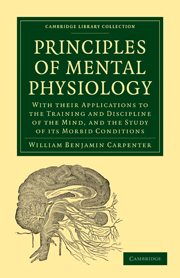 Principles of Mental Physiology
Principles of Mental Physiology Book contents
- Frontmatter
- PREFACE
- Contents
- BOOK I GENERAL PHYSIOLOGY
- CHAPTER I OF THE GENERAL RELATIONS BETWEEN MIND AND BODY
- CHAPTER II OF THE NERVOUS SYSTEM AND ITS FUNCTIONS
- CHAPTER III OF ATTENTION
- CHAPTER IV OF SENSATION
- CHAPTER V OF PERCEPTION AND INSTINCT
- CHAPTER VI OF IDEATION AND IDEO-MOTOR ACTION
- CHAPTER VII OF THE EMOTIONS
- CHAPTER VIII OF HABIT
- CHAPTER IX OF THE WILL
- BOOK II SPECIAL PHYSIOLOGY
- APPENDIX. DR. FERRIER'S EXPERIMENTAL RESEARCHES ON THE BRAIN
- INDEX
CHAPTER IX - OF THE WILL
Published online by Cambridge University Press: 29 August 2010
- Frontmatter
- PREFACE
- Contents
- BOOK I GENERAL PHYSIOLOGY
- CHAPTER I OF THE GENERAL RELATIONS BETWEEN MIND AND BODY
- CHAPTER II OF THE NERVOUS SYSTEM AND ITS FUNCTIONS
- CHAPTER III OF ATTENTION
- CHAPTER IV OF SENSATION
- CHAPTER V OF PERCEPTION AND INSTINCT
- CHAPTER VI OF IDEATION AND IDEO-MOTOR ACTION
- CHAPTER VII OF THE EMOTIONS
- CHAPTER VIII OF HABIT
- CHAPTER IX OF THE WILL
- BOOK II SPECIAL PHYSIOLOGY
- APPENDIX. DR. FERRIER'S EXPERIMENTAL RESEARCHES ON THE BRAIN
- INDEX
Summary
Section 1.—Influence of the Will on Bodily Movement.
305. “I am, I ought, I can, I will,” are (as has been recently well said) the only firm foundation-stones on which we can base our attempt to climb into a higher sphere of existence. The first implies that we have a faculty of Introspection, which converts a simple state of consciousness into self-consciousness, and thus makes it the object of our own contemplation:—the second, that we have submitted that state of consciousness (whether Thought or Feeling) to our moral judgment, which has pronounced its verdict upon it :—the third, that we are conscious of a freedom and a power to act in accordance with that judgment, though drawn by cogent motives in some different direction;-and the fourth, that we determinately exercise that power. Hence we may define Volition or Will as -a determinate effort to carry out a purpose previously conceived; and this effort may be directed to the performance of either the Mental or the Bodily acts which are adapted to carry that purpose into execution.—The manner in which this Volitional power is exerted in either case, and the conditions of its exercise, constitute our present subject of enquiry.
306. In our examination of the different forms of Nervous activity presented to us in the ascending series of Animal life (Chap. II.), we have found, as we appoach Man, blind unreasoning Instinct gradually giving place as a spring of action to rational Intelligence. But neither the performance of Reasoning processes, nor the execution of their results, necessarily involves the exercise of Will—at least in the sense in which it is here denned.
- Type
- Chapter
- Information
- Principles of Mental PhysiologyWith their Applications to the Training and Discipline of the Mind, and the Study of its Morbid Conditions, pp. 376 - 428Publisher: Cambridge University PressPrint publication year: 2009First published in: 1874


